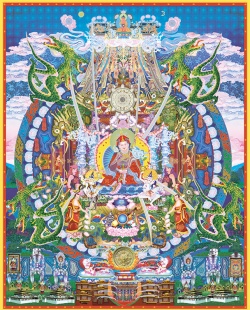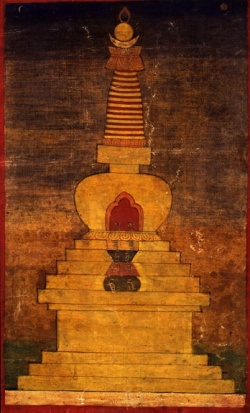Difference between revisions of "The Dzogchen Rinpoche lineage"
| Line 1: | Line 1: | ||
| − | + | [[File:Guru-01.jpg|thumb|250px|]] | |
<poem> | <poem> | ||
The First [[Dzogchen Rinpoche]] established [[Dzogchen Monastery]] in 1685, and became its first [[Abbot]]. Since that [[time]], members of the [[Dzogchen Rinpoche line]] have been the [[Abbots of Dzogchen Monastery]], along with members of the [[Dzogchen Ponlop Rinpoche]] line, and later, members of the [[Kushok Gemong Rinpoche]] line. | The First [[Dzogchen Rinpoche]] established [[Dzogchen Monastery]] in 1685, and became its first [[Abbot]]. Since that [[time]], members of the [[Dzogchen Rinpoche line]] have been the [[Abbots of Dzogchen Monastery]], along with members of the [[Dzogchen Ponlop Rinpoche]] line, and later, members of the [[Kushok Gemong Rinpoche]] line. | ||
| + | [[File:953 stupa.jpg|thumb|250px|]] | ||
| + | There have been seven [[Dzogchen]] [[Rinpoches]], as follows: | ||
| − | |||
The [[First Dzogchen Rinpoche]], [[Pema Rikzin]] | The [[First Dzogchen Rinpoche]], [[Pema Rikzin]] | ||
| Line 12: | Line 13: | ||
The [[Sixth Dzogchen Rinpoche]], [[Jigdral Jangchup Dorje]] | The [[Sixth Dzogchen Rinpoche]], [[Jigdral Jangchup Dorje]] | ||
The [[Seventh Dzogchen Rinpoche]], [[Tenzin Jigdral Lhunpo]] (b. 1964) | The [[Seventh Dzogchen Rinpoche]], [[Tenzin Jigdral Lhunpo]] (b. 1964) | ||
| + | |||
The history of the [[Dzogchen Rinpoche]] line that follows was written by [[Tulku Kalzang]], [[Essential]] Summary of the {{Wiki|Biographies}} of the Successive [[Reincarnations]] of [[Dzogchen Pema Rikzin]] (draft translation by the students of The [[Dzogchen Ponlop, Rinpoche]] 1998) (web version omits footnotes). The biographical work begins with this homage: | The history of the [[Dzogchen Rinpoche]] line that follows was written by [[Tulku Kalzang]], [[Essential]] Summary of the {{Wiki|Biographies}} of the Successive [[Reincarnations]] of [[Dzogchen Pema Rikzin]] (draft translation by the students of The [[Dzogchen Ponlop, Rinpoche]] 1998) (web version omits footnotes). The biographical work begins with this homage: | ||
Latest revision as of 14:08, 16 October 2013
The First Dzogchen Rinpoche established Dzogchen Monastery in 1685, and became its first Abbot. Since that time, members of the Dzogchen Rinpoche line have been the Abbots of Dzogchen Monastery, along with members of the Dzogchen Ponlop Rinpoche line, and later, members of the Kushok Gemong Rinpoche line.
There have been seven Dzogchen Rinpoches, as follows:
The First Dzogchen Rinpoche, Pema Rikzin
The Second Dzogchen Rinpoche, Gyurme Thekchok Tenzin
The Third Dzogchen Rinpoche, Ngedon Tendzin Zangpo (1759-92)
The Fourth Dzogchen Rinpoche, Migyur Namkhe Dorje (1793-?)
The Fifth Dzogchen Rinpoche, Thupten Chokyi Dorje
The Sixth Dzogchen Rinpoche, Jigdral Jangchup Dorje
The Seventh Dzogchen Rinpoche, Tenzin Jigdral Lhunpo (b. 1964)
The history of the Dzogchen Rinpoche line that follows was written by Tulku Kalzang, Essential Summary of the Biographies of the Successive Reincarnations of Dzogchen Pema Rikzin (draft translation by the students of The Dzogchen Ponlop, Rinpoche 1998) (web version omits footnotes). The biographical work begins with this homage:
Having overcome the power of the four maras,
[Your] body is utterly free from the extremes of samsara and nirvana.
Honored by Lord Brahma and all the devas,
I pay homage to you, the King of Munis and supreme
Aditya-bandhu, at my crown.
Embodying all the wisdom of the Victorious Ones and their heirs,
You manifested in the form of the Immortal King, the Vidhyadhara,
Atop the thousand peddled-lotus in the clear lake of Sindura.
Victorious One, born in the lake, I place your feet on my head.
In Silden [Cool Land], surrounded by white [snowy] mountains,
[You are] the supreme master of the Old Translation School of this country,
The naturally renowned Lord of Siddhas, Drupwang Dzogchenpa.
Father and sons of this lineage, please protect and nurture me at this time!
[Attained through] the accumulation of hundreds of virtuous offerings and generosity,
The qualities of the Mighty King of Gods are marvelous, yet he can not [liberate beings like you can].
Simply [hearing] your name liberates inferior beings.
So why not take this delight in presenting the biography of such a noble [being]?
The beautiful and melodious sounds of one thousand sitars of the gandharvas
Cannot compete with the wondrous melody of the meaning [of these biographies].
For those who have turned their ears far away from unpleasant sounds
I will at this time play this music of sustenance here.

